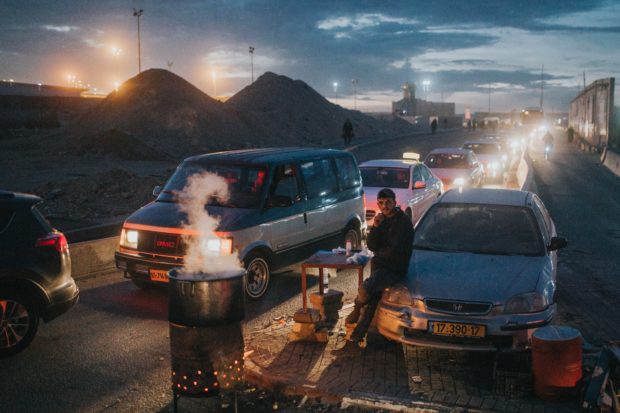You have no items in your cart. Want to get some nice things?
Go shopping
A flag was fluttering in the wind. Its design could not be seen clearly as the cloth kept waving and creasing up high on its pole. A man was looking up at it. He knew that it had three horizontal stripes; a white one between two blue, and in the centre was a six pointed star.
It stood above a watchtower where a sentry was sitting at the top. A long barrier with thick iron strips at the top and bottom blocked the path.
The traveller called to the sentry. “Do you speak English?”
A face looked down. “Of course.”
“Can I get through?”
“Maybe not today.”
Three men were sitting by the side of the road, dark skinned and scruffily dressed, with large bundles next to them. The man walked over, wheeling his suitcase.
One smiled at him. “Welcome.” He sat down and they passed him an orange. He peeled and ate it quickly, without feeling any taste. As they talked among themselves, he listened to see if he could understand but he knew too little of their language. Then they said a word that he had heard before. It signified something like revolution or resistance but here it referred to a specific movement about which he knew little.
After landing at the airport, there had been two short interviews, with a lengthy wait between them. He replied to his questioners directly. Towards the end, they seemed sympathetic about his choice of destination. After collecting his suitcase, he met up with the driver then it was a two hour drive. It had gone smoothly up to this point. He gave an anxious look to the barrier. If they didn’t let him through, he did not know what he was to do.
There was a figure on the other side of the barrier. He got up and called. “Are you Bill?”
The man replied, “Hi, Mansoor.”
That was something; his contact from the university was there. Some months before he had interviewed Mansoor on the phone and then offered him the job.
He had been drawn to the idea of living and working there. Reactions from friends and family were unpredictable. Some were genuinely impressed. Others acted supportive though he could tell that they thought his decision strange. His mother had given a shocked gasp.
After a while two boys and a girl came from the darkness. Each had a rifle strapped over their shoulder. They joked with the waiting labourers as they positioned themselves by the barrier. A loud electronic alarm signalled its opening. The soldiers looked at the workers’ papers and let them pass.
Mansoor stepped forward and handed over his passport. One of the boys leafed through it. He asked, “Where is your visa?”
Something had been troubling Mansoor but he had put it to the back of his mind. “They didn’t stamp it at the airport.”
The soldier spoke in his walkie talkie then said, “You can’t go.” Mansoor started to wheel his bag. “I said you can’t go.”
His shoulders sagged. He looked over to Bill. He walked towards him so he was in speaking distance. The soldiers followed. He was trying to calm his mind.
“They didn’t stamp my passport.”
Bill frowned. “What?”
Mansoor put his hand through his hair. “Shit, shit, shit.”
Bill turned to the soldiers. “It’s not his fault. He’s new here. He doesn’t know what’s going on. Security at the airport should have given him a stamp.”
Mansoor added, “They knew I was coming here. Isn’t it on computer or something?”
The boy shook his head. “There is no computer. What is the purpose of your visit?”
“I’m a teacher at the International University.” His voice was quivering.
The first soldier spoke on his walkie talkie again then turned to Bill. “I’m sorry. He can’t go through.”
Bill spoke to Mansoor. “You have to go back to the airport. I’ll call the driver.”
Mansoor was told to move away from the barrier. The alarm sounded again as it closed. The two boys and the girl headed back to their barracks, leaving him alone.
A pack of dogs approached the watchtower. Mansoor watched them. He took his suitcase, walked past the plain buildings and stopped by the roundabout leading into the checkpoint.
How could this have happened? He had to fight his tiredness and focus his mind. Maybe at the airport they would refuse to stamp his passport. Then the experience would be over before it began.
He looked over to the other side of the barrier but it was all darkness. He needed to know how people lived with death and he suspected that he could find out there, with those who lived within that space. He watched the lights of the cars in the distance, hoping that the taxi would arrive soon.

About Asim Rizki
Asim Rizki is the author of 'Year of The Scavenger'. He has worked as an English teacher in Tianshui, Jenin and Beirut. In the glory days of literary webzines, at the beginning of the century, his short stories were published in a few places.
- Web |
- More Posts(2)



